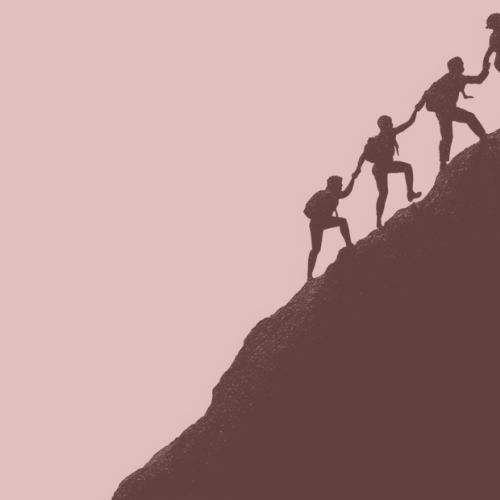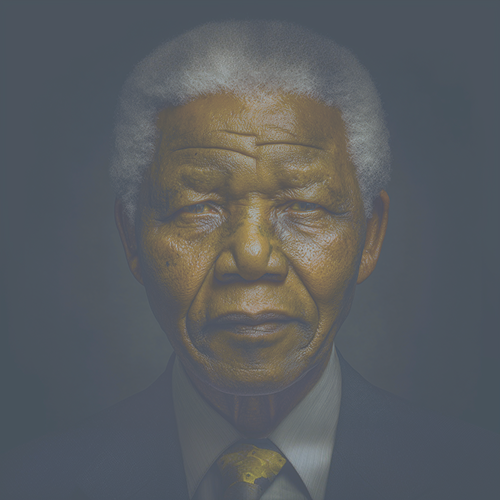Laurie Ruettimann: Sure. Well, years ago, I used to work at a very small pharmaceutical company by the name of Pfizer, nobody's ever heard of that, right? You know, not in the news. And I was doing very hard work. And I was heads down for a very long period of time. And I was young, but married, and found myself really letting my own wellbeing go. And I was unhappy, I was tired of sick all the time, and I was sore.
And when you're 29 years old, you're not supposed to sneeze and throw your back out. And that was happening to me, I really had to take a deep dive and understand what was going on with me.
And I noticed that the less I paid attention to my own individual well being, the more my work suffered, the relationship suffered. And also just my general overview, none of my friends liked me. Nobody enjoyed. always hearing about me complaining about my job.
Laurie Ruettimann: I had a moment at an airport, many, many years ago that I write about my book Betting on You, where I just decided enough was enough. I don't know if you've ever been on a business trip, and the only food you can manage to eat for dinner is like an airport snack.
And that night, I was eaten Starburst and drinking Pepsi at like eight o'clock at night on a layover. And I'm like, why not me? Why can't I eat better? Why can't I find balance? Executives do it. Entrepreneurs sometimes do and why not me?
And I made a pact with myself that night to turn things around. And it was slow. It required a lot of steps, including therapy. But in the end, it paid off. And about a year and a half later. That's when I decided to go out in the world and bet on myself as a writer and a speaker in the world of human resources. So yeah, I mean, I think it paid dividends. But there are a lot of steps along the way. And no, I didn't just up and quit my job, which I think a lot of people want to do.
Felicia Shakiba: In your latest work, you explore the intersection of work and alcohol, challenging traditional team building practices.
Could you elaborate on how these practices may affect diversity, equity and inclusion (DEI) within organizations and why it might be important to address today.
Laurie Ruettimann: I started my professional career journey in human resources as an intern. I wasn't going to go to law school didn't know what I wanted to do. And my career group at my university said, go take this internship at an HR job, you'll see everything sales, marketing, manufacturing, logistics, and maybe you'll find a path. And I did I found a path in human resources for good or for bad, but that was 1995. So think about it. Bill Clinton was president and the show Friends was on not even a reruns it was on in real time.
And back then the way people kind of came together was through alcohol, through happy hours, through bonding. You know, we'd get beer at the dock at the manufacturing facility. And that's nearly 30 years ago. And the way people get together today is through happy hours and teambuilding with a lot alcohol and sure there might be the opportunity for you to drink a Diet Coke. But there are a lot of reasons why that old playbook is broken.
For many people, they just don't enjoy alcohol like others. They can't afford to go to happy hour every night with their colleagues. And this idea that we need to come together with alcohol to be visible to be seen, to be considered for promotional opportunities is exclusive and old.
In the journey of exploring all of this, I have found that there are other really good ideas to bring people together, including during business hours when we're getting paid in innovation spreads, and a really awesome and amazing ways to collaborate, so that we don't have to take time out of our schedules to be seen and be promoted in the world of work. So yeah, I'm just done with that old way of thinking. If you want to drink, drink, you want to go out go out, but at least make better, smarter, more honest choices.
And I think corporate America and the global corporate landscape can do that for our workforce, and actually has an obligation to do it.
Felicia Shakiba: I love that thinking, I think it's incredibly relevant. There are many people who actually have come up to me and said, Oh, I have to go out with my co workers, and I'm going to be forced to buy a drink, but I don't really drink that much. And those conversations actually happen.
To take another deeper dive into what you're sharing, in your view, what role does vulnerability play in achieving personal growth and self-improvement in a professional setting? So can you share any experiences where embracing vulnerability, which you already have had a significant impact on your work or life?
Laurie Ruettimann (06:31): Well, you know, I coach, many executives, leaders, both in the C suite and in the world of human resources. And it's interesting to me because we talk about how culture starts at the top right, and creating psychological safety and spaces where we can be vulnerable, and express empathy and compassion. And the amount of leaders who are in positions of power who say to me, "I can't do that for myself," boggles the mind.
And so for me, in my work with these executive leaders, it's really about diving deeper and asking, Why can't you do that maybe it's board pressures, maybe it's activists, at the shareholder level.
There are a lot of reasons why they don't feel they can be vulnerable. But until we start at the top, it's absolutely ridiculous to expect that we can create these cultures where people can show up, be seen for who they are, and contribute in the best way possible.
That being said, I'm a big believer in micro cultures, you know, things that happen at the local level. So this is where inner leadership, self leadership can really do one a lot of good. So even if your executive leadership team doesn't create a culture where you feel like you can show up, even if you're CHRO, and your Chief Product Officer and your Chief Revenue Officer, are all about business and not about being human, you can be human with your peers.
You can go first. In fact, there's a lot of reasons why you should go first. Because a lot of times the grounds swell for promotion, the grounds swell for someone being elevated at the local level, happens at that peer to peer level. So you don't have to come to work and be so vulnerable, that people think you're weird. But you can start to share just even 10% more.
And in the eyes of your colleagues in the eyes of your peers, and even in the local vendor community that you operate in, that can be enough to start to propel your career journey forward. So don't go whole hog, don't go 100%. Just try 10% and see how that feels. And get some feedback along the way. That's what I recommend.
What does that 10% look like? Because I feel like there's a gray area. What does that actually look like? What do you mean by 10%?
Laurie Ruettimann (08:45): It could mean absolutely canceling a meeting, if you're in a position to do that, because you're not feeling it and talking about it. It could mean simply ending a meeting early. Or it can mean when someone is late for a meeting, taking them offline just a peer and say you were late for a meeting. And I mean, I showed up on time, it was really difficult. I just wanted to give you the feedback that when you show up late, you hold everybody back.
And I want to understand why you made that choice. It can mean a lot of different things. But being brave and being bold is the key differentiator at any level on your career path.
So if you don't do it, and you wait for other people to do it, it may never happen.
And I'm here to tell you that the story you're telling yourself about- you can't do it, you can't just do 10% is a false story. And if you get fired, if you get dinged, if you get held back, well, that's a good indication that you shouldn't be there in the first place and it's time to move on. So I'm trying to help people move from self imposed victimhood to a place of greater freedom. And I think so many of us have more privileged than we've recognized than we admit, and it's time to bet on ourselves and take a risk.
10% is not a lot to ask for, and the thing that you'll gain with making that 10% move is greater than you can ever anticipate. I know this for a fact, I've been coaching people now and working with people for almost 30 years, and these self imposed limitations, well, it's time for them to go.
You've mentioned before that you no longer focus on HR, but on the practitioner. What does that mean? Exactly?
Laurie Ruettimann: I don't have any illusion that one woman no matter how big or mediocre, my case or platform is, can fix work. I think we fix work by fixing ourselves first. And so if I can be helpful to an HR leader, individually, or an HR practitioner, that's where I'm going to go. I feel like for so long HR has forgotten that they're employees too, but their employee experience matters, that they're not floating between executive leadership teams in the workforce, they are the workforce. So if I can get down to a very practical level with an HR Director or an HR VP, or an HR business partner, it's my goal to do that.
You know, we often wonder why the workforce is so angry, and yet we complain about our own jobs, right? Well start there, try one thing, a quarter that's bugging you, like try attacking that. And if you could fix that for yourself, it has a positive downstream impact for the rest of the organization. In my work when HR leaders and HR practitioners complain about things like child care? Well, let's look at child care.
Let's look at what benefit your company does or doesn't offer, and see if we can improve that even incrementally. Because if we fix it for you, we're going to fix it for hundreds of people.
The concept of work life balance has evolved in recent years, as you're sharing with us now, how do you define and approach this balance? How do you suggest organizations approach creating a culture where employees feel like leaders care about their wellbeing, especially when many organizational cultures tend to reward the after-hour worker?
Laurie Ruettimann (12:14): Such a good question. For years, I took on this paternalistic tone, or I thought employers should absolutely meet the needs of the workforce, in I think soft and amorphous ways. And we saw that really hit its high note during COVID, where it was like, We want you to feel good, let's talk about our feelings, let's create these spaces where everybody can come together. As we come out of the pandemic, I've almost done a 180.
I think, if we give our workforce the space, and opportunity to do great work, if we put in front of them meaningful tasks and amazing challenges, and we actually give them the space to do that, we do give them work life balance, because what we're saying to them is, nothing else matters, except this really important work that we need you to do. Nothing else matters except you doing your best, you being excellent.
And everything else, we're willing to have a conversation about, do we need greater automation? Do we need better clarity on the working hours that you have? Do we need to reconfigure and rethink our team structure for you to do this amazing work? I think if we focus on doing that excellent work, the balance can follow.
But it's this ongoing conversation. But this idea that I'm gonna make you feel good about your childhood and about what's happening in the world is so paternalistic, it's so condescending, and I'm ready to ditch some of that language for the language of tackling meaningful problems in this world.
In your book, you talk about integrity as a fundamental element of self leadership. Could you share your perspective on how individuals can maintain their integrity in environments that might not always align with their own values?
Felicia Shakiba: Well, integrity is really at the core of everything, not just your professional life, but your personal life. You have to know who you are, and what you stand for, and also what you won't stand for what are the non-negotiables? And I think sometimes we do these exercises, maybe when we meet with the EAP, or we come together as a team, but we don't mean it. We don't explore it regularly.
So understanding who you are, what you stand for, and what you won't stand for is a monthly, is a weekly, is a daily activity and something that I do all the time when people ask me to do things I'm like, Where do I stand? What do I believe in? Right?
But it's a practice kind of like any good thing in life is a practice like exercise is a good practice. Eating according to the way your body needs to be fueled as a practice, nobody can do this for you. Nobody can make time on your calendar for this for you except you.
Laurie Ruettimann (15:00): So, integrity, being at the core of everything is super important. And I think sometimes we go into work environments, and it tests our integrity, and we think we can change it. And there's a lot of good research out there from Bob Sutton from Amy Edmondson from all leaders, all the great thinkers, my friend Minda Hearts, does amazing work on this, that the environment is more likely to change you negatively than you are to change the environment.
The most important thing you can do when you feel like your integrity has been challenged, is to get the heck out.
You don't have to leave today. You don't have to leave tomorrow, but have a plan of action, so that you don't continually face these, I think attacks on your body, your mind, your spirit, your soul. And you've got a way out.
And it could be through focusing on continuous learning. It could be by working on yourself through your health insurance and your personal welfare benefits that you get through an organization so that you're eventually in a good place to leave. But take advantage of all the benefits that are afforded to you in that job that's crushing your soul that's challenging your integrity, so that when you're ready to move, you're moving towards something and not away from something.
Felicia Shakiba: You mentioned before that you are more selective about the leaders you work with.
What qualities or characteristics do you look for in leaders who are genuinely committed to improving the wellbeing of their employees?
Laurie Ruettimann (16:31): I look for vision. And one of the really important things that I do in my intake in my onboarding process as a coach, and just as a person who wants to have good friends, right? I want to align myself with people who have a vision for what the future of work looks like. I'm not expecting them to fix things. I expect them to be realistic. We all have to collude with capitalism in our own way, no matter where we are on the planet.
But I want someone who knows what the promise land looks like. What it looks like to work with a great team for them, what it looks like to build great teams, and to articulate it in a way that's persuasive, and not just putting some language out there from great leaders.
I want someone who can take me through a vision of their day, a day that looks rewarding and a day where they make a contribution. Those are the people I work with. So when I put out a call like mine, I'm accepting a couple of new people in a cohort, I'm in an active conversation with these people. And also, I do something that's a little bit different than other coaches.
I have a rider in my clause that says, if at any point, I feel like you need therapy, or you need an intervention, we're gonna stop or work together and we're not going to start again, until you see a therapist.
I have people sign that all the time, and I live that value. And then they fight me like, well, we only have two sessions left, can't we do those two sessions? No way, not until we move forward with a real plan for getting you what you need, and it's not me. It's a different process, but I think it's a good one. I've good feedback on it.
Felicia Shakiba: Well, I would imagine that someone who needs that personal therapy, it would be very challenging to get your work done as a professional if they didn't go through that first.
Laurie Ruettimann: It's such a waste of time...
Felicia Shakiba : Right?
Laurie Ruettimann: ...to figure out who you are and what you stand for at work and where your career is headed if you're having panic attacks, before going into work, which is very common. The amount of men and women who feel a sense of dread at the executive level who feel a sense of dread, a sense of panic regularly. It's just it's offensive to me that people put themselves through that.
The other thing on a very practical level - executives more and more feel like regular workers, they can't disconnect from technology, they feel like they're always on. I was recently at the HR Technology Conference and heard a statistic that 77% of executives feel like they're always on.
They never get a break. And if that's how a leader feels, imagine how someone feels on the customer service line or on the packaging line, right? You're- or even just working in procurement. If your leaders are stressed and overwhelmed, it's a terrible cascading effect down to the regular workforce. Tackling that is more than just coaching. It's really about rethinking your life in total. And I can't do that. I don't have a PhD in psychotherapy. But I know people who do.
Your approach seems to encourage individuals to take charge of their work experiences, what strategies or techniques do you recommend for someone who wants to initiate a positive change in their work environment, even if they're not in a leadership position?
Laurie Ruettimann (19:43): Yeah, well, I do like the activity of recognition and reflection. So understanding who you are and what you'll stand for and what are non negotiables in your life. That's a quick and easy exercise that you can put on the calendar to do weekly. So how do you think critically? How do you have good cognitive abilities, if you're not sleeping, and you're not fueling your body right? The amount of women I know who are on a diet of Diet Coke until about two in the afternoon is just unfathomable.
They wake up they may have a cup of coffee, but they're on Diet Coke, they miss breakfast, they miss lunch, if they eat anything at all, if they work from home, they're eating off their toddler's plates or their children's leftovers, right? How can you make a good decision when calorically you're not fueling your brain?
Just to get through the day science says at the very minimum just to function and keep our organs moving, we need 2000 calories. I don't know many women who are getting 2000 calories, good calories a day, or they're stacking their calories until late at night when the work is done. And they're making big meals for their family members. And it's like a calorie bomb late in the evening. And they wonder why they're not sleeping, right. So really, getting good nutrition is important. When I talk to people who absolutely say they're burned out, we don't pursue coaching, until we understand their body batteries.
Again, people over the age of 35 over the age of 40, who haven't had a physical in years, it's like, you can't work with me unless you get a physical. That's brass tax. So you don't have to get coaching to get a physical, go get a physical, this is what your health insurance pays for -go ahead and do that. I mean, if you're listening to this podcast, you absolutely have that benefit. Go pursue it and understand where you are because if your body is not operating at an optimal level, your heart, your mind and spirit are not going to operate at an optimal level. So go get that physical.
Is there anything else that you feel would be good for our listeners to know or learn?
Laurie Ruettimann (21:55): I think every successful executive I know has a hobby; they do things outside of work. And actually, Harvard Business Review, Stanford and Cornell, they've all done immense studies, Michigan State, Michigan, have done amazing studies on the impact of learning outside of your personal domain on your domain. So if you're learning, you're growing, if you're growing, you're thriving, and that's what life is all about.
And if you're learning about things outside of your predominant domain, so if you work in human resources, and you're learning about flower arranging, it's amazing how your body and your mind make new connections and you bring that energy, and that cognitive mapping to the work that you do on a daily basis. So whenever I work with someone, I absolutely insist like a maniac, that they go get a hobby, like you can't just do HR, you can't just do leadership alone.
So I've worked with executives and I share the story all over the place. And one in particular, I was very moved by. He was really in his job all the time. And it was making him cranky, and he wanted to leave and he wanted to become a consultant. I said before you do that, let's like pick a hobby and do that for 30 days and keep a learning journal. And so he said, Well, you know what, I've wanted to work on perfecting my brisket.
Okay, all right, I'm in this Yeah, I was vegetarian at the time, but I'm still in it. And so he went on this 30 day journey of really grilling out more perfecting his brisket doing things he needed to do. And a couple of things he learned. Not only did he learn patience, and he learned, of course, the ability to fail and laugh at himself.
But he spent more time cooking, which meant he spent less time on a phone, and he spent less time working. He also spent more time with his family and community feeding them food that he made with love by hand and getting silly feedback and input on his technique and input on his rub and his timing and all of that.
Laurie Ruettimann: And if you know anything about cooking a brisket, you can't do that in 20 minutes. This is a labor of love, right? So this is something that freed up his brain to think in different ways. It's almost like when you take a long shower, and suddenly you have a good idea.
Brisket was his long shower. But I've also worked with women who used to be ice skaters when they were kids. And they went out and laced up their skates and started skating again, and didn't do it well and fell a bunch of times but really enjoyed it.
So there's a lot of lessons to be learned from learning in other ways. And also taking those stories back to work. It makes you a wholly differentiated individual and honestly, it helps remind people around you that you're fun. So anybody can do this. Anybody can go on a 30 day learning journey and just write it down. The good, the bad, the ugly, reflect on it, and I guarantee you it's a fun experience and it actually deprioritizes work and prioritizes you.
It helps you put yourself at the center of your own story and we all need that.
Felicia Shakiba: Laurie, it's an honor to have you on the show. Thank you so much for being here. I'm gonna go perfect my brisket now.
Laurie Ruettimann: I love it. I encourage you to do that and I'm ready. I'm eating brisket again. So invite me over.
Felicia Shakiba: Anytime.
















